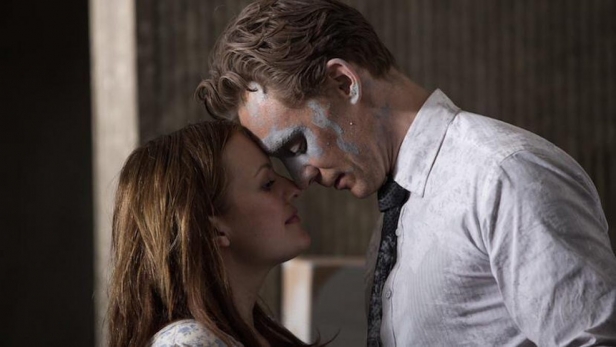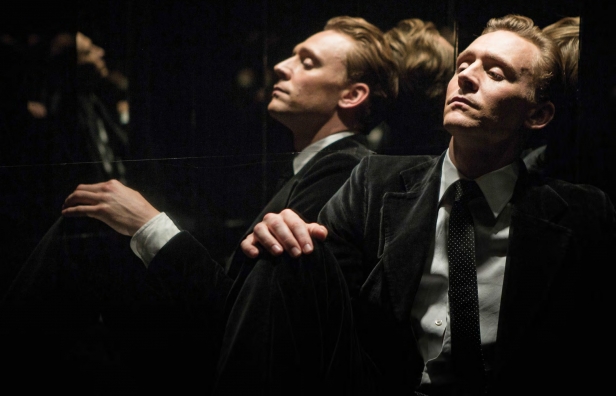Filmmakers have been trying to bring JG Ballard’s High-Rise to the big screen for decades. David Cronenberg was an obvious early choice (it’s impossible to watch the film and not think of Shivers), and Cube director Vincenzo Natali was attached more recently. It’s taken A Field In England and Kill List’s creative team of director Ben Wheatley and writer Amy Jump to finally deliver the film of the nightmarish, darkly comic tower block tale, and it’s already proven to be incredibly divisive. While many seem to have taken (really quite strongly) against High-Rise ’15, we felt quite the opposite.
Tom Hiddleston stars as Dr Robert Laing, one of the residents in the first of five new tower blocks created by visionary architect Anthony Royal (Jeremy Irons). The wealthy live in luxury at the top, while the less-well-off families, including Richard and Helen Wilder (Luke Evans and Elisabeth Moss) are much further down the chain.
Clashes at the swimming pool and arguments over power failures lead to lines being drawn, and humanity breaks down. As the rich embrace revolting decadence and the poor scavenge and revolt, where will Laing find himself?
Fans of the novel will be relieved to hear that the film begins much as the book does, with Hiddleston roasting a dog over an open fire on his balcony, a bloodied electric kitchen knife a clue to the time period and a hint that Wheatley’s dark sense of humour is just as important to this adaptation as his gift for getting under your skin.
Indeed, with many of the most shocking offences kept off-screen, it’s a savage satire rather than a darkly comic horror; often bombastic, very stylish, and with a fantastically oppressive atmosphere. Everything is heightened from an early stage, from the raucous children’s birthday party at the Wilders’ flat to the ludicrous excesses of the Royals, whose Marie Antoinette-esque parties are nauseating. As Keeley Hawes’ Ann Royal rides a horse on the roof terrace and the children are denied access to the pool, the social commentary is as subtle as a brick but it most certainly makes an impact.
The casting is perfect, and everyone sinks their teeth into Jump’s dialogue. Irons is on terrific form as Royal, distantly aware that something terrible is happening but unwilling to stoop to engage with it. Sienna Miller is excellent as Charlotte Melville, a ray of well-intentioned sunshine that will inevitably be snuffed out, as is Moss as the lonely, neglected Helen Wilder, while Evans channels Oliver Reed as her voracious, violent alpha husband in his best performance to date. Wheatley continues to deploy actors mainly known for comedy to great effect, with Reece Shearsmith as Laing’s spiteful cuckolded neighbour and Dan Skinner as the upper class’ muscle.

Through all of this, Hiddleston’s Laing drifts, unable or unwilling to fit in anywhere, whether it’s at Charlotte’s booze-drenched parties or the ludicrous soirees in the penthouse. As “definitely the best amenity in the building,” different tenants use him for different purposes, whether it’s for sex, reassurance, manipulation or his medical skills, but his own agenda remains deliberately vague. As the situation goes from bad to worse, Laing attempts to distance himself and discovers his true identity in the process. It’s a tricky performance to get right and Hiddleston does an superb job, using his looks and charm to create a superficially appealing character, and twisting it to make him scarily unreadable.
The shift from civilised behaviour into savagery happens gradually, and then very suddenly, with much of the change shown in a montage set to a beautifully morose cover of Abba’s ‘SOS’ by Portishead. It’s heavily stylised (Evans’ direct-to-camera dancing is hard to forget) and Wheatley encourages the actors to play up the revolting and the ridiculous (James Purefoy goes above and beyond), resulting in more comedic moments than some viewers may be expecting or wanting.
As the film progresses Wheatley beautifully conjures the ever-more toxic atmosphere of an uneven society gone violently to rot. Sex and violence are near-constant, alcohol is omnipresent, cruelty is casual, children are forgotten, and the outside world is irrelevant. The “catalyst for change” is a pressure cooker from which no one can escape, and no one seems to want to anyway.
It’s important, too, to praise the excellent production design by Mark Tildesley and Laurie Rose’s great cinematography for making a film set in the 70s feel like it might have actually sprung from that decade.
Wheatley’s High-Rise is not without its flaws or missed opportunities, and it will alienate as many as it engages, but this gruesome, scabrously funny and bold adaptation is most definitely worth taking a chance on.
High-Rise is playing at the BFI London Film Festival on 9 and 11 October, find information here. Keep up with the latest genre news with the new issue of SciFiNow.
